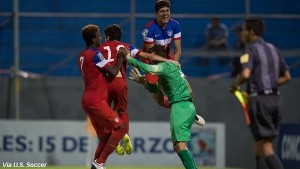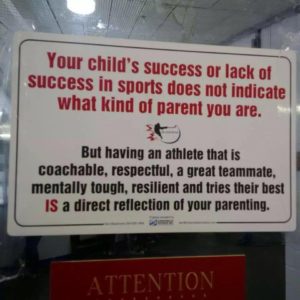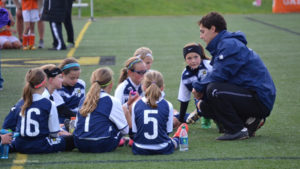When Passion Turns to Punches: Managing the player who’s too hot to handle
 I was surprised to see Washington Nationals baseball star Bryce Harper pictured with teammate Jonathan Papelbon’s hand wrapped around his throat on the front page of the Washington Post yesterday morning. The Nats have, as Post columnist Thomas Boswell puts it aptly, proven they could make a total team collapse even worse.
I was surprised to see Washington Nationals baseball star Bryce Harper pictured with teammate Jonathan Papelbon’s hand wrapped around his throat on the front page of the Washington Post yesterday morning. The Nats have, as Post columnist Thomas Boswell puts it aptly, proven they could make a total team collapse even worse.
Papelbon has since been suspended four games for his role in the altercation and Harper is sitting out one, but the issues the incident raises are interesting to consider.
+READ: LeBolt: Ten lessons from the women of the World Cup
Papelbon has a reputation as a lightning rod for controversy and Harper’ hotheadedness has earned him ejections from several games this year. Here are two examples of what we see plenty of from young, talented, albeit emotionally undisciplined athletes.
Frankly, kids who sit quietly with hands folded while they await instructions are not usually my superstars. It’s the kids who are chomping at the bit, who want to get at it, and don’t want to be told what to do before they try it themselves, who are usually the spark plugs of the team and the impact players you want to leverage.
Kids with passion for the game don’t compartmentalize it; that’s part of their package. So how can we manage players with passion for the game that bubbles a little too hot? Here are a few approaches.
Option 1. Zero Tolerance — Hold the Line
Sit ‘em till they behave and when that doesn’t work, kick ‘em off the team to make an example of ‘em. Those who use this approach generally bring very high expectations for behavior. They are concerned that others on the team will use any leeway offered this kid as permission to engage in their own version of unacceptable behavior. Thus, to prevent any contagion, the problem child must be excluded until he can behave according to the team standards.
Pro: better environment for remaining kids
Con: excluded kid does not improve his behavior and may not return to sport
The “hard to handle” player is the place where a great manager is priceless. They’re not there just to field the best 11 or to sketch strategy or give a great pep talk.
Option 2. Excuse the behavior when they’re young. ‘Boys will be boys.’
When kids get together, you can expect a little rough-housing. With boys this tends to be physical. With girls it tends to by psycho-social. With patience and an eye out to make sure no one “really” gets hurt, things will settle down after the “pecking order” is established. It’s the way animals of all kinds operate in communities. Humans are no different and kids are learning how this works.
 Pros: Letting kids work it out which may increase the “grit-factor” with players
Pros: Letting kids work it out which may increase the “grit-factor” with players
Cons: Hard to see invisible wounds which may rebound in hidden retribution and degrade team chemistry
Option 3. Punish the Player
At the first sign of trouble, or certainly when the behavior becomes repetitive, penalize the kid so she knows she’s done wrong and will be motivated to avoid the behavior in the future. Penalizing is tricky because it embarrasses the kid in front of her peers and strains the relationship between coach and kid. Fear of punishment isn’t the motivation we want for kids’ behavior or sport play. The mild-mannered kids and those previously unaware of their disruption will probably knock it off. The kid who is “acting out” may enjoy the extra attention and step up their efforts.
Pro: Behavior is not allowed to continue and corrections can be put into play
Cons: Strong-willed kids will likely accept this challenge and see how far they can push things
Option 4. Punish the Parents
Assumption: disruptive kids are the result of poor parenting. Problem kids should be sent back to their parents so they can do better.
A popular online shared photo (at right)  features this: “Your child’s success or lack of success in sports does not indicate what kind of parent you are. … But having an athlete who is coachable, respectful, a great teammate, mentally tough, resilient and tries their best IS a direct reflection of your parenting.”
features this: “Your child’s success or lack of success in sports does not indicate what kind of parent you are. … But having an athlete who is coachable, respectful, a great teammate, mentally tough, resilient and tries their best IS a direct reflection of your parenting.”
You’ll get a lot of agreement on this. Parents with well-behaved, hard-working children will relish the opportunity to click and like. Well-managed children do tend to be well-mannered children. But the reverse isn’t necessarily true. Parents with strong-willed kids may be doing all they know how to do to manage their kids who still misbehave. In these cases, parents need help and support and constructive suggestions. They will already be well-acquainted with reprimands and notes from the teacher.
Those “other” parents — the ones who really are not parenting responsibly — will not respond to team pressure, will not know their role in things and/or will take it out on their kid.
Pros: Approaching parents honestly but with a helping hand can be the best thing for the kid
Cons: Punishing poor parenting often backfires and it’s always the kid who loses when it does
Option 5. Establish a Team Culture
What is the team culture? What are we all in this for? Be clear about philosophy, expectations and consequences when rules are broken. The Positive Coaching Alliance has some great ideas and tools to help to put this into play. Even when things go badly and the team loses or the players lose sight of their goals and perspective on the game, a strong team culture can rescue a lot of dignity.
Pros: There’s a concrete plan and clear expectations
Cons: Every plan has loopholes and holding the line can be hard and unpopular
 The “hard to handle” player is the place where a coach who is a great manager of his or her players is priceless. They’re not there just to field the best 11 or to sketch strategy or give a great pep talk — although that’s all good.
The “hard to handle” player is the place where a coach who is a great manager of his or her players is priceless. They’re not there just to field the best 11 or to sketch strategy or give a great pep talk — although that’s all good.
The great manager knows and mentors his or her players and can look at their “issues” honestly without forgetting their strengths. That is the key with these hard to manage kids: we don’t want to toss the talent with the tantrum. We want to help them get a handle on their emotions and polish their rough edges.
Former Nationals manager Davey Johnson once said of 19-year-old superstar Harper, “He’s just a 100-percenter. And he expects great things out of himself. He breaks bats, throws his helmet. He’s just got to stop it. Can’t afford to be losing him in a ballgame with that. He’ll learn.”
+READ: Play with a Purpose: The simple solution to our kids’ stress crisis
Harper knows. “I just need to stop getting [angry] and just live with it and there’s nothing you can change. I just need to grow up in that mentality a little bit,” he said. “Try not to bash stuff in and things like that I’ve always done my whole life and those need to change.”
In baseball, like other professional and high-level sports, there are many coaches but only one manager (or head coach). The staff coaches work with specialties. The successful manager puts it all together. In the case of this year’s Nationals, I wouldn’t want to be in manager Matt Williams’ shoes come end of this season.
Do you have hard to handle kids? What do you do to draw the best out of ‘em without breaking their spirit?
SOCCERWIRE MARKETPLACE
- The St. James FC Virginia 2024-2025 Travel Tryouts
- TSJFCV - Hiring Travel Soccer Coaches
- Hiring: U13-U19 Boys Director
- Coaches Needed
- Train with professional AC Milan coach
- Loudoun Soccer 2024/25 Travel Player Placement Sessions
- Official Elite Summer Soccer Camps with Elite Pro Clubs in Europe
- Official EPL Tickets: ARSENAL, LIVERPOOL, TOTTENHAM & MORE
- Travel to Denmark for Dana Cup Hjørring 2024
- New England Surf Challenge and Showcase 2024











